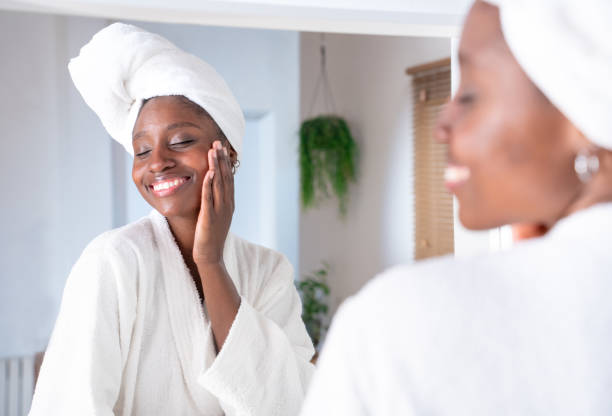
Living with psoriasis on your face can be challenging, especially for Black individuals, as the condition can present differently in Black skin. With the right approach, you can manage psoriasis effectively. Here are nine tips tailored to help care for your skin and minimize flare-ups:
1. Gentle Cleansing
Use a mild, fragrance-free cleanser to wash your face. Avoid harsh scrubbing, as it can irritate your skin and worsen psoriasis symptoms. Instead, gently massage the cleanser onto your skin using your fingertips, and rinse with lukewarm water. Pat your skin dry with a soft towel, avoiding rubbing, which can cause irritation.
2. Moisturize Regularly
Keep your skin hydrated by applying a moisturizer daily. Look for products that are hypoallergenic and non-comedogenic to avoid clogging pores.
Black skin tends to be drier, so using a rich, emollient moisturizer can help maintain skin hydration and improve the appearance of psoriasis patches.
3. Sun Protection
Protect your skin from the sun's harmful rays, as sunburn can trigger psoriasis flare-ups. Black skin has more melanin, which provides some natural sun protection, but it's still important to use a broad-spectrum sunscreen with an SPF of 30 or higher.
Consider wearing a wide-brimmed hat for added protection, especially if you're outdoors for an extended period.
4. Avoid Triggers
Identify and avoid triggers that worsen your psoriasis, such as stress, certain foods, and skin irritants. Black individuals may be more prone to post-inflammatory hyperpigmentation (darkening of the skin) after psoriasis flare-ups, so it's essential to manage triggers to prevent further skin discoloration.
5. Use Makeup Carefully
If you use makeup, choose products that are labeled "non-comedogenic" and "fragrance-free." Avoid heavy foundations and opt for lighter formulations that won't clog pores or irritate your skin.
Be gentle when applying and removing makeup, and consider using makeup brushes instead of your fingers to minimize irritation.
6. Manage Stress
Stress can worsen psoriasis symptoms, so it's important to find healthy ways to manage stress. Consider practicing yoga, meditation, or deep breathing exercises to help relax your mind and body. Engaging in regular physical activity can also help reduce stress and improve your overall well-being.
7. Stay Hydrated
Drinking plenty of water can help keep your skin hydrated from the inside out. Aim to drink at least eight glasses of water a day to maintain healthy skin. Avoid excessive consumption of caffeine and alcohol, as they can dehydrate your skin and worsen psoriasis symptoms.
8. Consult Your Dermatologist
Work closely with your dermatologist to develop a treatment plan that's right for you. They can prescribe medications, such as topical corticosteroids or oral medications, to help manage your psoriasis.
Your dermatologist can also provide guidance on skincare products and techniques that are safe and effective for Black skin.
9. Be Patient
Managing psoriasis on your face may take time, so be patient with yourself. With consistent care and treatment, you can help keep your skin healthy and minimize flare-ups.
When to See a Doctor
If you experience severe or persistent symptoms of psoriasis on your face, such as intense itching, pain, or skin cracking, it's important to see a dermatologist. They can evaluate your condition and recommend appropriate treatment options to help manage your symptoms and improve your skin health.
Managing psoriasis on your face may take time, so be patient with yourself. With consistent care and treatment, you can help keep your skin healthy and minimize flare-ups.
Remember, everyone's experience with psoriasis is unique, so what works for one person may not work for another. It's essential to find a skincare routine and treatment plan that works best for you. If you have any concerns or questions, don't hesitate to reach out to your healthcare provider.







